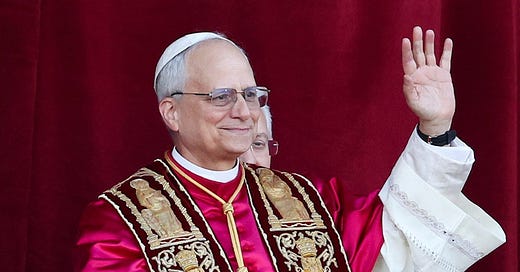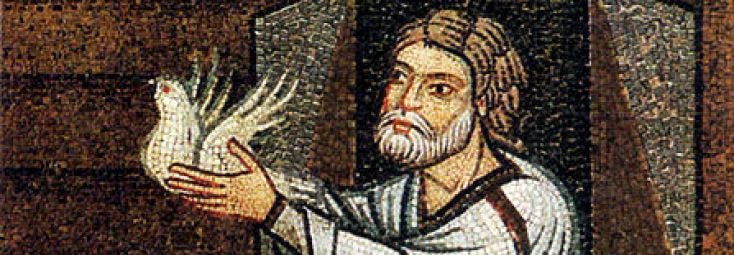Leo XIV and the Jubilee Year of Hope
The College of Cardinals offer American Catholics a Fresh Start Amidst the Polycrisis
Note: this newsletter is also available at the betterpolitics.substack website, which gives access to dozens of previous posts.
Yesterday, the College of Cardinals came to a surprisingly quick consensus that the American born Cardinal Robert Francis Prevost (pronounced Pray-vohst) was the best man to lead the Catholic Church at one of the most tumultuous and pivotal times in human history.
[OSV News/Reuters/Claudia Greco]
Among a field of impressive candidates, the now Pope Leo XIV obviously had stellar credentials. These include a deep faith, a missionary spirit, decades of service as a pastor and shepherd, a sharp mind, a solid education, teaching experience, a global perspective, long experience as leader of his global religious community, along with experience in administration and in the Vatican.
Until recently, however, most informed observers of the Vatican would have seen the choice of an American as impossible, especially because of the disproportionate influence already wielded by the United States in global affairs. Another factor against him was his relatively young age, which suggests a long and, therefore, consequential papacy.
Taking account of the signs of the times, however, the College of Cardinals quickly reached consensus that such an eminently qualified American would best serve the needs of not only the Catholic Church but the whole human family.
In what follows, I will first embed some previous posts that indicate how the Vatican has been reading and responding to the signs of the times in the months before the conclave. Second, I will offer some brief remarks on how his chosen name of Leo XIV not only signals the primary lens through which he sees his papacy, but also why this is a source of hope for the Church and world.
Vatican Readings of the Signs of the Times
Modern Catholic social teaching speaks frequently of reading the signs of the times. This phrase alludes to Jesus’ words in chapter 16 of the Gospel According to Matthew. By reading these signs, Jesus refers to understanding present events in light of God’s in-breaking reign which is being realized through is his words and powerful deeds.
During the pontificate of Francis, his reading of these signs was reflected especially in his social encyclicals including Laudato si’: On Care for Our Common Home (2015), and Fratelli tutti: On Fraternity and Social Friendship (2020).
In Laudato si’, Francis called attention to the urgent need to address the climate crisis that was rapidly escalating due to the human exploitation of the natural environment. This call went largely unheeded, however, especially because the United States under the first Trump Administration withdrew from the Paris Agreement that had been negotiated and signed by 196 countries in 2016. With the climate crisis rapidly progressing by 2023, Pope Francis reiterated his urgent call to action through the Apostolic Exhortation Laudate Deum: To All People of Good Will on the Climate Crisis.
In Fratelli tutti, Francis called upon everyone to recognize the dark clouds that threaten the future of the human family, and to fend them off by coming together in a spirit of social friendship oriented to action. Besides the climate crisis, another dark cloud concerns the contemporary breakdown of the postwar political order. This order had been created by the Allied Powers after the Second World War, with the United States as the linchpin of the whole postwar international order and financial system.
Catholics informed by our social tradition, moreover, had been instrumental in building this postwar liberal order. These exemplary Catholics included the venerable Robert Schuman of France, Conrad Adenauer of Germany, and Alcide de Gaspari of Italy. Few contemporary American Catholics understand this history, or how American Social Catholics like Msgr. John A. Ryan helped to the United States to avoid the interwar threats of fascism and socialism and build a relatively stable and prosperous society after the war. Few American Catholics, however, have appreciated how the postwar order not only reflected significant Catholic contributions, but required our ongoing participation to flourish.
Instead, Catholics have largely forgotten our social doctrine with many adopting an alternative model of social conservativism crafted by Republican political operatives like Paul Weyrich around especially the issue of abortion. This social conservatism has included an anti-institutionalism that was largely advanced by libertarian think tanks funded by aspiring oligarchs seeking to shrink the institutions that might counter their power. If this weren’t bad enough, some of the most influential Catholic intellectuals have been arguing against the constitutional democratic order corresponding to contemporary Catholic Social Doctrine.
Instead, therefore, of recovering our social tradition to join in solidarity to dispel the dark clouds threatening a dystopian future as Francis had exhorted us, a majority of Catholic voters—with the postwar order hanging in the balance—instead empowered a radical right-wing administration whose policy could be described as “burning the whole thing down.”
In this context, the Vatican announced a Jubilee Year centered on the theme of hope.
Pilgrims of Hope and Agents of Fraternity
As is evident from his social encyclicals including the 2015 Laudato si’: On Care for Our Common Home (LS) and the 2020 Fratelli Tutti: On Fraternity and Social Friendship (FT), Pope Francis is acutely aware of the grave challenges that threaten the human family. In
Striking a similar balance between realism and hope, The Pontifical Academy for Life on held lenten General Assembly on “The End of the World? Crises, Responsibilities and Hope.”
Lent and the General Assembly on 'The End of the World?'
This year’s celebration of Ash Wednesday marks the beginning of the penitential season of Lent during a frightening time in human history. The first text from today’s Office of Readings provides a clear statement of the kind of repentance God seeks from us, and which I think has great relevance to the socio-political situation in the United States. It …
Pope Leo and the Renewal of Social Catholicism
During this Easter season, the Catholic world was surprised—and largely delighted—by the selection of an American Pope, who was known to be closely aligned with Pope Francis. By taking the name of Leo XIV, our new pope has clearly signaled that he reads the signs of the times much like Pope Francis. That is, he has signaled that he will be a pope focused on fostering a renewed appropriation of Catholic Social Teaching so that Catholics can play their indispensable part in meeting the great challenges of the global polycrisis.
As commentators have been quick to note and Pope Leo confirmed, the choice of the name Leo is clearly a signal that our new Holy Father is looking back to the papal inaugurator of modern Catholic Social Teaching. That is, he is taking his inspiration from Pope Leo XIII, who published the first modern social encyclical, Rerum novarum: On Capital and Labor (1891). This encyclical, it should be noted, was both the fruit of earlier agents and movements of social Catholicism, and the inspiration for subsequent ones.
This encyclical—in response to the Industrial Revolution—traces back to the influence of the so-called father of modern Catholic social teaching, the German Bishop Wilhelm E. von Ketteler. The model of modern social Catholicism that Ketteler forged included the solicitude to recognize the problem, the study and dialogue to both understand it and consider potential solutions, and participation in the political process to enact reforms. All of this was deeply grounded in Scripture and in dialogue with trusted points of reference, especially Thomistic ethics. Ketteler inspired study circles of Catholic laity and clergy across Europe whose work influenced the writing of Rerum novarum.
Social Catholics in especially Europe and the United States were inspired by the encyclical to work locally on the various challenges presented by the Industrial Revolution. These tended to follow what James Chappel has called a fraternal mode of collaboration for the common good, as distinguished from a paternalistic model of aligning with state power to coerce traditional morality, a common temptation for some Catholics. In France, these social Catholics were even willing to collaborate toward social reforms with anticlerical supporters of the Third French Republic. Although Pope Leo XIII had encouraged such support of the Republic, these social Catholics were attacked for doing so by the proto fascist integralists. They were skillfully defended, however, by the great philosopher Maurice Blondel.
In the early twentieth century Italy, there were several exemplary social Catholics who struggled toward what would eventually be the great success of postwar Christian democracy. These included Fr. Luigi Sturzo, who was eventually recognized as the father of Christian democracy, but only after his postwar return from the long exile he was forced to take during the Mussolini regime.
In the United States, the most influential social Catholic in the first half of the twentieth century was Msgr. John A. Ryan, who helped the United States bishops to bring Catholics into the coalition of those working toward a just society. In the second half of the century, Fr. Ted Hesburgh, CSC of the University of Notre Dame was an exemplary representative of Catholic social teaching.
In recent decades, however, many American Catholics became part of the socially conservative Republican coalition centered on opposing the legalization of—for example—abortion and gay marriage. Few noticed how this entailed a departure from the fraternal stance of the social Catholics and the adoption of the paternalistic stance of interwar Catholic integralists, who had been discredited for their interwar alliance with fascists.
On the one hand, the more comprehensive and fraternal perspective of Catholic social doctrine has been largely forgotten. On the other hand, influential Catholics have been advancing integralism and aligning with aspiring authoritarians. Regarding institutional support to effectively advance an authentically Catholic social vision to meet our contemporary challenges, we have much work to do. Those advancing alternative visions, on the other hand, have seemingly insurmountable advantages.
In this context, I think the election of Pope Leo XIV is a moment of grace for the Catholic Church in especially the United States. In the face of the global polycrisis, a wide range of Catholics see in him a new source of hope, and this is inseparable from his call for a renewal of our social tradition to meet the challenges of our day. But of course, we are just getting to know him, and he is just getting started.
I hope and pray, however, that this new pontificate can be an occasion to recognize the signs of the times and act accordingly. I think this would require a broad recovery of Catholic Social Doctrine—and of the social Catholicism that embodies it—precisely to address the grave challenges of our day, starting with the renewal of American democracy. If we want to not only live the authentic faith of the Church, and realize the renewal sought by the Second Vatican Council—to say nothing of fending off a dystopian future—this task merits our prayers and zealous commitment.







